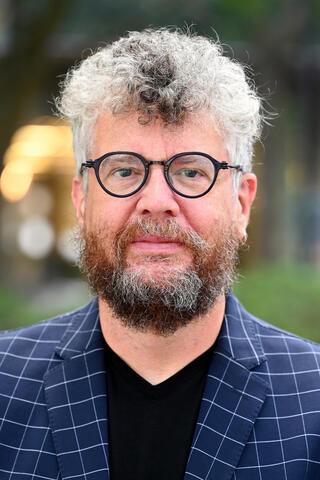 My name is Charlie Clarke and I’m a Professor of Computer Science and Associate Dean of Innovation and Entrepreneurship in the Faculty of Mathematics. I’m excited to introduce the Spring 2022 issue of E-Ties, which focuses on entrepreneurship.
My name is Charlie Clarke and I’m a Professor of Computer Science and Associate Dean of Innovation and Entrepreneurship in the Faculty of Mathematics. I’m excited to introduce the Spring 2022 issue of E-Ties, which focuses on entrepreneurship.
The Faculty of Mathematics’ entrepreneurial prowess is no secret. We’re known in Canada and across the world over as a hotbed for innovative new ventures. I like to think the entrepreneurial spirit is embedded in our institutional DNA and thus central to who we are and how we see the world. Our early visionaries—giants like Don Cowan and Wes Graham—were among the first to recognize the revolutionary potential of the computer. Unwavering in their conviction that computing would shape the future, they worked tirelessly to bring an IBM 360/75 mainframe—the most powerful computer in Canada at the time—to the Davis Centre.
This act alone was entrepreneurial in its prescience, but they didn’t stop at establishing Waterloo as a place where computers were studied. They also ensured Waterloo was a place where computers were put to use in the service of society. Graham and Cowan helped found WatCom (now Sybase), one of the University’s first startups and a company that transformed the landscape of programming languages forever.
This entrepreneurial spirit remains vibrant today. Over 500 start-ups have their origins in the Faculty of Mathematics, including industry leaders like OpenText, Maplesoft, RapidNovor, and Faire. Inspired by this tradition, graduates like Robert Madej continue to translate their math knowledge into global businesses. Madej’s wealthtech firm, PureFacts Financial Solutions Inc., is creating products that solve complex challenges with advanced mathematics, data analytics and AI.
The importance of co-op
When looking at our entrepreneurial legacy, we cannot underestimate the influence of another key Waterloo innovation, our world-leading co-operative education program. Waterloo students are incredibly talented, it’s true, but there are talented students at all of the world’s top universities. What sets our students apart is the time they spend working at the world’s most innovative companies. During work terms, they see firsthand how industry leaders are approaching difficult problems and using cutting-edge technologies. Then they bring all this knowledge and experience back to the classroom. I can assure you it keeps us professors on our toes: when your students are thinking like Google engineers, you must constantly be seeking new ways to challenge and excite them.
The influence of co-op is plainly evident in the stories featured in this issue. Husband and wife Alex Hoff and Heather Hoff both came to Waterloo for the renowned co-op program. Their co-op experiences led them on journeys of self-discovery and enabled them to find their true passions and become entrepreneurs.
Then there is Pooja Viswanathan and Joseph Lee, both of whom drew on their co-op experience when launching their respective companies (Braze Mobility and Volanté Systems) and now hire Waterloo co-op students to fill important roles.
Rich and diversified entrepreneurial education
Co-op by itself does not fully explain the entrepreneurial genius of Waterloo. Co-op gives students a real-world connection, but without our fertile on-campus learning environment—one in which students can further explore the interests they acquired during co-op—our students wouldn’t be so special.
Math students can take enriched classes. They can do an eCapstone project. They can work side-by-side with our best researchers. (You want to learn theoretical machine learning? Sure, you can work with some of the world’s top experts.) And, whereas at other schools, there is always a concern about how to engage students with new offerings, at Waterloo, students are lining up to get involved. They actively seek out these challenges.
Consider the story of Jason Amri, a student who is maximizing his time in our unique ecosystem. In addition to a typically demanding computer science course load, he has worked with both the Problem Lab and Velocity to hone his vision for 3cycle, a startup that tackles the urgent problem of global plastic waste.
And then there is Ronuk Raval, the founder of Encircle, who has returned to Waterloo to help build the next generation of entrepreneurs by running the eCapstone Customer Discovery workshop.
The Future of entrepreneurship in FOM
The magic of our entrepreneurship ecosystem cannot be duplicated anywhere else—but that doesn’t mean that we in the Faculty can’t continue to build on its success. That’s what my team in the Math Innovation Office is working on right now. Indeed, at a time of pressing social and economic challenges, we feel an obligation to maximize our impact on the world.
How will we enrich entrepreneurship at Waterloo? In part, by multiplying the connections between our students and the rest of the ecosystem so that the transition from eureka-moment inspiration to fully-fledged venture is as fast and frictionless as possible. One of the ways we will do this is through the creation of an Entrepreneurship Fund, which will enable us to provide our students with important entrepreneurial programs and activities, including pitch competitions, conferences, one-on-one mentorship with industry leaders, and education covering a range of relevant topics, from IP policy to the legal aspects of commercialization.
If you are interested in being involved in entrepreneurship in the Faculty of Mathematics, I encourage you to get in contact with me (mathinnovation@uwaterloo.ca). We are always on the lookout for alumni to volunteer, mentor, serve on committees, and make meaningful donations in support of new initiatives. Your participation is critical. Our students can learn so much from people like you, who have stood in their shoes, faced the same challenges, and gone on to outstanding success as entrepreneurs and entrepreneurial employees.
In the meantime, I hope you enjoy the issue!
Warmest regards,
Charlie Clarke
Professor, Cheriton School of Computer Science
Associate Dean, Innovation and Entrepreneurship





